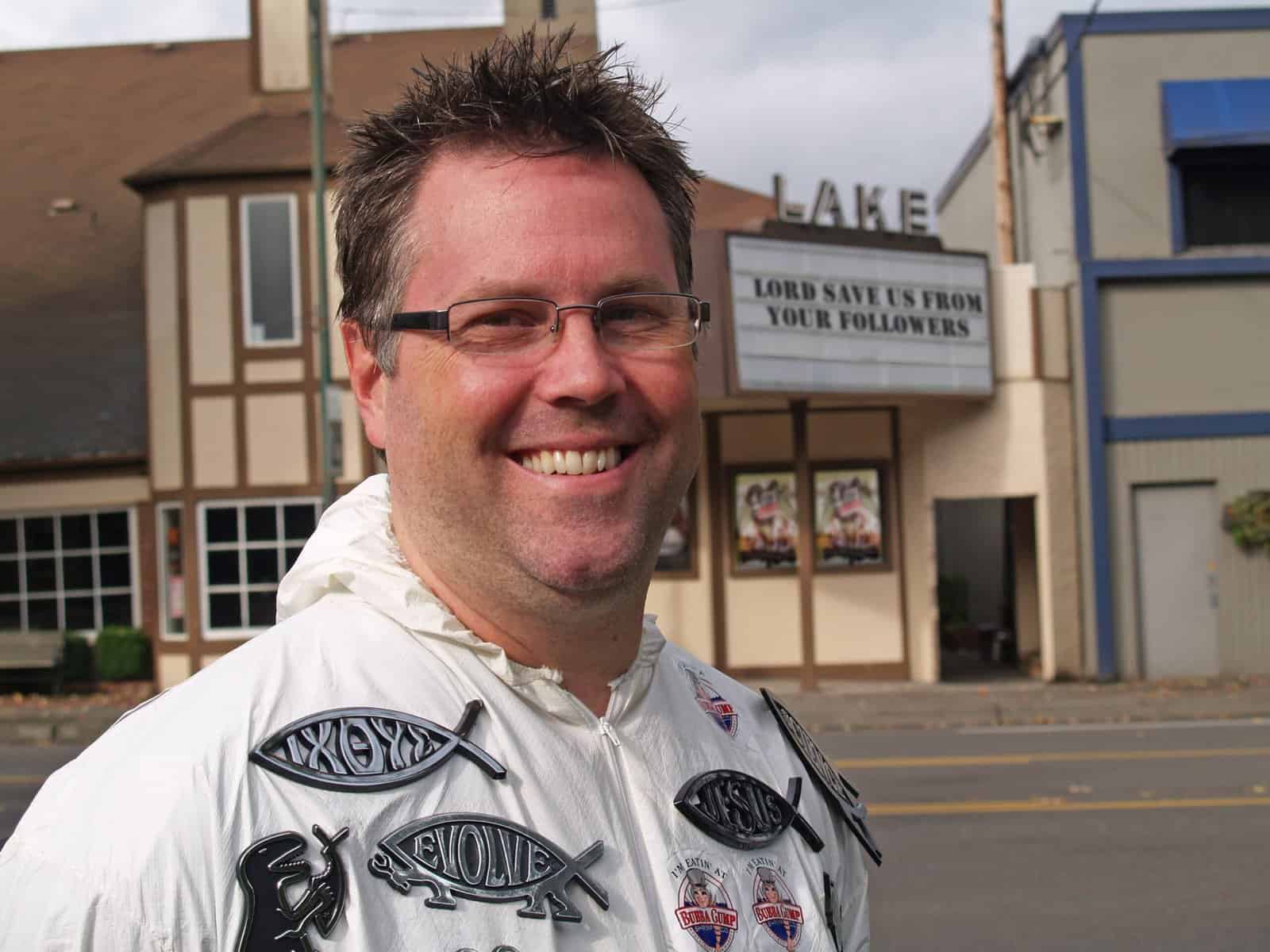 Dan Merchant thinks that America has become a bumper-sticker culture. “We’re way too comfortable with one-way communication,” says Merchant. “We like to tell people what we think, but we don’t like to listen.”
Dan Merchant thinks that America has become a bumper-sticker culture. “We’re way too comfortable with one-way communication,” says Merchant. “We like to tell people what we think, but we don’t like to listen.”
To remedy this, Merchant hit the streets of Times Square decked out in a white coverall plastered with an array of worldview-distilling bumper stickers: God Spoke and Bang It Happened. God Wants Spiritual Fruits Not Religious Nuts. Overturn Roe v. Wade. Free Jesus. Real Men Pray. Get the Hell Out of My Way, I’m Late for Church. Who Would Jesus Bomb? You get the picture.
Merchant’s suit—along with his open countenance and large microphone—drew out passersby and sparked countless conversations, all of which were filmed for his documentary, Lord, Save Us from Your Followers, and captured in his book of the same name. Among the questions he asked were, “What is something Christians are known for?” and “What is something Jesus Christ is known for?” His search for honest dialogue was rewarded as people of all stripes shared their true feelings about Christians and about Christ. We tracked him down to hear what he discovered as he crisscrossed the country in search of genuine conversation.
What did you learn about Christians from your project?
Often, Christians don’t realize how we sound to others. We come off arrogant, strident, and condescending when we think we’re being gracious and charitable. Perhaps we’re so used to talking amongst ourselves that we’ve developed a shorthand that doesn’t translate to those unfamiliar with Christian-speak. Also, many of us have become hung up on “being right” as opposed to answering Jesus’ call to love one another. We feel, at times, that unless we’re fulfilling the self-appointed rule of “defending the truth,” we are somehow going to let the side down. The remarkable thing, of course, is that “the Truth” is the amazing love of God, and when you spend time with Christians who are sharing that with others unconditionally, God shows up and all kinds of weird and beautiful things happen. So I learned that the Christians who are trusting in God’s truth and grace and are figuring out ways to love people and meet their needs seem to have a much better idea of what Jesus was getting at than those Christians who prefer to shout at those they disagree with on social and political issues.
What did you learn about people outside the Christian faith?
I was surprised to learn that most people who have a problem with Christians don’t have a problem with Jesus. They may not identify Jesus as the Christ, but nobody seems to want to argue that “loving the least” is a bad thing. The fact that many don’t associate Christians with the actions and principles of Christ was a bit disturbing, of course. But this disconnect also illustrates that a communication breakdown may play a major role in the social conflicts we’re enduring, as opposed to fundamental disagreements of how we really ought to be treating each other. I was quite moved by the response of agnostics and atheists to the film. The moments in the film that illustrate self-sacrificial, unconditional love touched them deeply, inspiring many to join alongside Christians into service of those in need. The love of God brings hope and understanding. I’ve seen it firsthand, repeatedly. We believers just need to be sure we’re the conduit and not the obstacle.
What were the most surprising experiences you had while working on this project?
We amassed over 100 hours of footage shooting interviews and segments for the film over a span of three-and-a-half years, and I had my soul turned inside out in the process—so this is a big question. The most surprising, emotional moment was setting up a confession booth at a Gay Pride event in Portland, Ore., and confessing my sins and those of the church I love to members of the gay community. My offering was graciously received, and I had many shockingly beautiful, healing, and open conversations during that day in the confession booth. No arguing, just talking and crying and laughing. Amazing what happens when you aren’t afraid of a little humility, when you are open and transparent and you invite God to sit with you and some new friends.
I was blown away by the openness of those who visited the confession booth. Their generosity, willingness to engage, and thirst to talk about God, love, and faith assured me that we’ve been doing this all wrong for years. Love first and let God do his thing.
Other highlights include interviewing Al Franken as he began his successful bid for a Senate seat; talking with Dr. John Perkins, the wisest, deepest soul I’ve ever met; hanging out with Dr. Tony Campolo, a powerful intellect; getting to know William Paul Young, a sweet and thoughtful man who articulates God’s love so beautifully in his book The Shack. And, of course, Sister Mary Timothy, the flamboyant gay nun of the San Francisco order of the Sisters of Perpetual Indulgence, whom I now call my friend.
What do you believe is the solution to our bumper-sticker culture? What are some practical ways—that don’t involve donning a bumper-sticker suit and hitting Times Square!—to nurture and engage in real conversation?
Ultimately, conversation is an easy place to start. Bring a little humility and engage those who aren’t like you, and you will learn about yourself and God as well as “the other.” We spend a lot of energy being around people who are similar to us while there is so much to be learned from those who aren’t like us. Think about what “venturing out” might mean to you. You can go to a religious service or denomination that is foreign to you. Try volunteering with a group or serving a group unfamiliar to you.
You can start in your own sphere and widen your reach from there: Is there someone at work whom you despise? Try to see them as God sees them and figure out how to engage them in a new way. Is there someone in your neighborhood you just plain don’t like? Get out of your own way and reflect a little of God’s love. Create a little space in these difficult intersections and see if God doesn’t show up. If there is someone you know in need, figure out a way to meet that need. If you have a gift or a talent that is burning a hole in your heart, find a place to share it, find out who needs what you have to offer.
Love trumps the simplistic “rightness” of the bumper-sticker culture, which is probably why Jesus boldly commanded us to love one another. Let’s start there and see what happens.
Dan Merchant’s documentary includes small group discussion videos and other bonus features.


